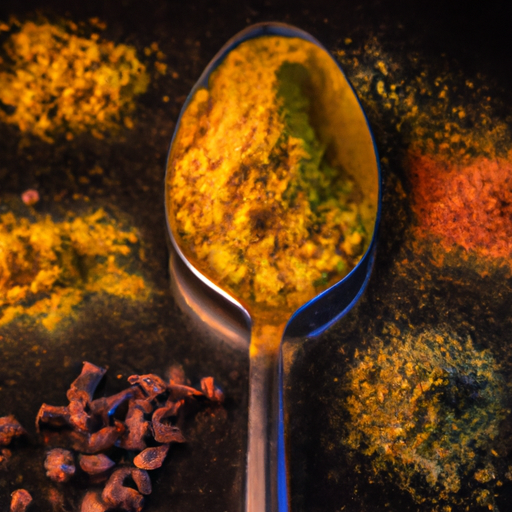As a person frequently falling ill, I constantly seek out natural solutions for improving my health. A favorite solution of mine is turmeric tea. This spice, known for its use in age-old medicinal practices, boasts anti-inflammatory and antioxidant benefits.
When combined with hot water, ginger, lemon, and honey, turmeric can create a soothing and healing drink that can help alleviate symptoms of coughs, colds, digestive issues, arthritis, heart health problems and even improve skin health.
In this article, I will explore the science behind turmeric tea and its various health benefits. We will also discuss how to make the perfect cup of turmeric tea and what precautions you should take when consuming it.
Whether you’re feeling under the weather or just want to add a healthy beverage to your daily routine, turmeric tea may be just what you need to boost your immune system and stay healthy all year round.
Key Takeaways
- Turmeric tea has anti-inflammatory and antioxidant properties which make it a natural remedy for various illnesses.
- The active ingredient in turmeric, curcumin, can reduce inflammation, boost immunity, and aid in managing arthritis pain.
- Turmeric tea can benefit digestion, heart health, and respiratory function, as well as protect against chronic diseases.
- When making turmeric tea, high-quality ingredients should be used, including fresh ginger and turmeric roots, and black pepper should be added for increased absorption of curcumin.
The Health Benefits of Turmeric Tea
You’ll be pleased to know that consuming turmeric tea when you’re feeling under the weather can provide you with a plethora of health benefits. Turmeric has been used for centuries as a natural remedy for various illnesses due to its anti-inflammatory and antioxidant properties. In fact, some studies have shown that curcumin, the active ingredient in turmeric, may help reduce inflammation and boost immunity.
Aside from providing relief from colds and flu symptoms, turmeric tea also has other potential health benefits. For instance, it may help lower cholesterol levels and improve heart health. Moreover, turmeric supplements have been found to aid in managing arthritis pain and reducing the risk of certain types of cancer.
If you’re not a fan of drinking plain turmeric tea or want to mix things up, you can try making a turmeric latte instead. Simply add some milk (dairy or non-dairy), honey or maple syrup for sweetness, ginger for added flavor, and nutmeg on top for some extra spice.
Now that we’ve covered the health benefits of turmeric tea, let’s move on to how to make this delicious drink at home without any hassle.
How to Make Turmeric Tea
When making turmeric tea, it’s important to use high-quality ingredients for maximum health benefits.
To prepare the tea, I start by boiling water and adding fresh ginger and turmeric roots or powder.
After simmering for 10-15 minutes, I strain the mixture and add honey or lemon for taste.
This warm and comforting beverage can be enjoyed any time of day and is a great way to incorporate more anti-inflammatory compounds into my diet.
Ingredients
Adding a dash of black pepper to your turmeric tea can enhance its health benefits and taste. Black pepper contains a compound called piperine, which increases the bioavailability of curcumin in turmeric. Curcumin is the active ingredient in turmeric responsible for its numerous health benefits. By adding black pepper, you increase the absorption of curcumin by up to 2000%.
To make a delicious cup of turmeric tea when sick, you’ll need the following ingredients:
- Turmeric powder – 1-2 teaspoons
- Fresh ginger root – 1 inch piece (optional)
- Black peppercorns – 2-3 (optional)
Turmeric tea can be made using various ingredients such as honey, lemon juice, or cinnamon for added flavor and aroma. However, these are optional and dependent on personal preference.
When making this tea to help relieve symptoms when sick, it’s important to use fresh ingredients and high-quality spices to maximize their medicinal properties.
Moving into preparation, start by boiling water in a kettle or pot until it reaches boiling point before continuing with the next steps.
Preparation
First, start by boiling water in a kettle or pot until it reaches boiling point to create a warm and comforting beverage that can help alleviate discomfort during times of illness. While the water is heating up, gather all the necessary ingredients for the turmeric tea. Once the water has boiled, pour it into a mug over 1-2 teaspoons of grated or ground fresh turmeric root. Add a pinch of black pepper and stir to combine. Allow the mixture to steep for at least 5 minutes before adding honey or lemon juice for extra flavor.
Turmeric tea benefits are numerous, with its anti-inflammatory properties being particularly effective in reducing inflammation caused by sickness. The active ingredient in turmeric, curcumin, also helps boost the immune system and aids in digestion. When brewing turmeric tea, keep in mind that fresh turmeric root will provide more potent health benefits compared to powdered versions. Additionally, adding black pepper increases the absorption of curcumin into the body. With these brewing tips in mind, you’ll be able to enjoy all the benefits this soothing drink has to offer while recovering from an illness.
Moving on to serving suggestions…
Serving Suggestions
To fully savor the health benefits of this golden-hued brew, consider pairing it with a slice of warm, buttered toast. The combination of turmeric tea and toast not only makes for a comforting snack but also provides a balanced mix of carbohydrates, protein, and healthy fats to fuel your body when you’re feeling under the weather.
Here are some presentation ideas to make your turmeric tea experience even more enjoyable:
- Add a drizzle of honey or maple syrup to sweeten up your drink.
- Sprinkle some cinnamon or nutmeg on top for an extra kick of flavor.
- Serve in a clear glass mug so you can admire the beautiful color and aroma.
Turmeric tea is not just any ordinary beverage; its medicinal properties have been recognized for centuries. In the next section, we’ll delve deeper into the science behind turmeric tea and how it can help alleviate symptoms associated with sickness.
The Science Behind Turmeric Tea
Did you know that sipping on a warm cup of turmeric tea can provide various health benefits due to its natural anti-inflammatory properties? Turmeric, a spice commonly used in Indian cuisine, contains a compound called curcumin which has been found to have numerous potential health benefits.
One of the most promising areas of research involves the effect of turmeric tea on cancer and brain health. Studies suggest that curcumin can help prevent certain types of cancer by inhibiting tumor growth and reducing inflammation. In addition, it may also have neuroprotective effects that could help improve cognitive function and memory.
While more research is needed in this area, incorporating turmeric tea into your diet may be a simple way to support overall health and well-being. As we transition into discussing how turmeric tea can benefit coughs and colds, it’s important to note that while it may offer some relief due to its anti-inflammatory properties, it should not be relied upon as a sole treatment for these conditions. Instead, consider incorporating it as part of a comprehensive approach to managing symptoms such as rest, hydration, and seeking medical advice when necessary.
Turmeric Tea for Coughs and Colds
If you’re feeling under the weather, a warm cup of this golden elixir can soothe your throat and help alleviate congestion. Imagine steam rising from a mug filled with vibrant yellow liquid, swirling with hints of ginger and honey.
Turmeric tea has long been used as a natural remedy for coughs and colds due to its anti-inflammatory and antioxidant properties. Turmeric contains curcumin, which is known to have powerful anti-inflammatory effects that can help reduce swelling in the throat caused by excess mucus production. It also has antiviral properties that can help fight off flu symptoms such as fever, body aches, and fatigue.
Adding ginger to turmeric tea further enhances its healing benefits as it contains compounds that have immune-boosting properties. Sipping on turmeric tea for sore throats and flu symptoms not only helps alleviate discomfort but also supports overall health. Its anti-inflammatory effects may even improve lung function in people with respiratory diseases such as asthma or chronic obstructive pulmonary disease (COPD).
Now, let’s move on to how turmeric tea can aid in digestive issues without any further ado.
Turmeric Tea for Digestive Issues
You may have experienced digestive discomfort in the past, but have you tried incorporating a warm and soothing elixir into your routine to help alleviate symptoms? Turmeric tea benefits are numerous, especially when it comes to digestion. This bright yellow spice has been used for centuries in traditional medicine to treat various ailments, including digestive issues.
Brewing tips for digestive health include adding black pepper to your turmeric tea. Black pepper helps increase the bioavailability of curcumin, which is the active ingredient in turmeric responsible for its anti-inflammatory properties. Drinking turmeric tea regularly can also aid in reducing inflammation in the gut, which can lead to bloating and gas relief.
Turmeric tea for bloating and gas relief is a natural alternative to over-the-counter medications that can cause unwanted side effects. It is also an effective way of maintaining digestive health by promoting healthy bowel movements and preventing constipation.
As we transition into discussing turmeric tea for arthritis, it’s important to note that inflammation plays a significant role in both digestive issues and joint pain.
Turmeric Tea for Arthritis
I’ve personally experienced the benefits of turmeric tea for arthritis. Research has shown that turmeric’s anti-inflammatory effects can reduce joint pain and stiffness in arthritis patients.
Regular consumption of turmeric tea may improve joint mobility, making it a promising natural remedy for those with this condition.
Anti-inflammatory Effects on Joints
Turmeric tea can work wonders for your achy joints. It has been known to bring down inflammation levels and provide relief. The anti-inflammatory effects of turmeric are well-documented. Studies have shown that its key active ingredient, curcumin, can help manage joint pain associated with conditions like arthritis.
Curcumin works by blocking certain molecules that contribute to inflammation in the body. This helps reduce swelling and stiffness in the joints, which in turn can alleviate pain and improve mobility. By incorporating turmeric tea into your daily routine, you may find that you experience less discomfort and greater ease of movement when performing everyday activities such as walking or standing.
With regular use over time, turmeric tea could be a valuable addition to your overall joint health regimen.
Improving Joint Mobility
As I mentioned earlier, turmeric tea has anti-inflammatory effects on joints, which can help reduce joint pain and improve overall joint health. But did you know that regular consumption of turmeric tea can also lead to improved joint mobility?
One study found that curcumin, the active ingredient in turmeric, can enhance the production of collagen, a protein essential for maintaining healthy cartilage and preventing joint deterioration.
Additionally, exercise is another key factor in improving joint mobility and reducing joint pain. Studies have shown that exercise can increase muscle strength around the joints and promote blood flow to the affected areas. When combined with regular consumption of turmeric tea, individuals suffering from joint pain may experience significant relief and improved quality of life.
With this knowledge about the benefits of both regular exercise and turmeric tea on joint health, we can now explore how this powerful spice may also benefit our cardiovascular system.
Turmeric Tea for Heart Health
You can improve your heart health by regularly drinking turmeric tea, which has been shown to have antioxidant and anti-inflammatory properties. These benefits extend beyond just the cardiovascular system and contribute to overall wellness.
Turmeric is rich in curcumin, a compound known for its powerful anti-inflammatory effects that can protect against chronic diseases like heart disease. Studies have found that curcumin may lower cholesterol levels, reduce blood pressure, prevent the buildup of plaque in arteries, and improve endothelial function (the lining of blood vessels). All these factors are crucial for maintaining good heart health.
Additionally, curcumin’s antioxidant properties can neutralize harmful free radicals that damage cells and tissues leading to various diseases. Incorporating turmeric tea into your daily routine is an easy way to support your heart health. But it’s important to note that while turmeric has many potential health benefits, it shouldn’t be considered a cure-all or substitute for medical treatment.
In the next section on ‘turmeric tea for skin health,’ we’ll explore how this ancient root can also benefit our largest organ – the skin.
Turmeric Tea for Skin Health
Improving your skin health is as easy as regularly incorporating a delicious and antioxidant-rich beverage into your daily routine. Did you know that studies have shown that the curcumin in turmeric can help reduce inflammation and even improve some skin conditions like acne? In fact, turmeric tea has been used for centuries in Ayurvedic medicine to treat various skin ailments.
Turmeric’s anti-inflammatory properties can help calm redness and irritation associated with acne. Additionally, its antibacterial properties may also help fight the bacteria that cause breakouts. But turmeric tea doesn’t just benefit those with acne-prone skin. Its antioxidant properties can also aid in preventing signs of aging by neutralizing free radicals that damage our skin cells.
To give you an idea of how powerful turmeric is for your skin, here’s a table showcasing some of its benefits:
| Benefit | How Turmeric Helps |
|---|---|
| Anti-Inflammatory | Reduces redness and swelling |
| Antibacterial | Fights breakout-causing bacteria |
| Antioxidant | Protects against free radical damage |
As with any new addition to your diet or skincare routine, it’s important to take precautions and be aware of potential side effects. We’ll explore these further in the next section about precautions and side effects to keep in mind when consuming turmeric tea.
Precautions and Side Effects
As I continue to explore the benefits and risks of turmeric tea, it’s important to discuss precautions and potential side effects.
One key concern is determining a safe dosage, as excessive consumption can lead to stomach upset or even liver damage.
Additionally, individuals taking certain medications, such as blood thinners or diabetes drugs, should exercise caution due to possible interactions with turmeric compounds.
It’s crucial to stay informed and consult with a healthcare provider before adding any new supplements or remedies to one’s routine.
Safe Dosage
When you’re sick, it’s important to remember that a safe dosage of turmeric tea is about 1-2 teaspoons per day. Consuming more than this amount may lead to potential risks such as digestive issues and liver problems. It’s recommended to consult with a healthcare professional before starting any new supplement regimen, especially if you have pre-existing medical conditions or are taking medications.
To ensure that you’re getting the most out of your turmeric tea while staying within safe limits, consider the following tips:
- Start with a small amount: Begin by adding just ¼ teaspoon of turmeric powder to your tea and gradually increase the dose over time.
- Monitor for side effects: Pay attention to any changes in digestion or other bodily functions after consuming turmeric tea.
- Avoid taking on an empty stomach: Turmeric can irritate an empty stomach, so it’s best consumed with food.
Remember that maintaining a safe dosage of turmeric tea is crucial when using it as a home remedy during illness.
Now let’s move on to the next section about possible interactions with medications.
Possible Interactions with Medications
Be careful not to mix your medications with turmeric tea, as it could potentially cause adverse reactions in your body. Turmeric contains active compounds that may interact with certain drugs and herbal supplements, leading to unwanted side effects or reduced effectiveness of the medication. It is important to consult with a healthcare professional before adding turmeric tea or any other herbal supplements to your daily routine, especially if you are taking prescription medications for a chronic condition.
To help you understand the possible interactions between turmeric tea and some common medications, I have created a table below based on information from reputable sources such as the National Institutes of Health (NIH) and the Memorial Sloan Kettering Cancer Center. Please note that this is not an exhaustive list and there may be other drugs or supplements that can interact with turmeric. Always talk to your doctor or pharmacist before taking any new supplement or medication together.
| Medication/Supplement | Possible Interaction | Evidence Level |
|---|---|---|
| Blood Thinners | Turmeric may increase | Moderate |
| (Warfarin | the risk of bleeding | |
| Aspirin | – Avoid high doses | – Case reports |
| Ibuprofen | – Monitor for GI issues | – In vitro |
| Methotrexate | – Reduced efficacy | – Animal studies |
| Statins | – Elevated liver enzymes | – Human studies |
While turmeric has many potential health benefits, it is essential to exercise caution when taking it alongside prescription medicines or other supplements. Be sure to inform your healthcare provider about all the medications you are currently taking before incorporating turmeric tea into your diet. With proper guidance and monitoring, you can safely enjoy the healing properties of this ancient spice without any adverse consequences.
Frequently Asked Questions
Can turmeric tea be consumed during pregnancy?
When it comes to consuming turmeric tea during pregnancy, safety and benefits must be considered. While turmeric has many health benefits due to its anti-inflammatory properties, there isn’t enough research on the effects of consuming turmeric tea during pregnancy. Some studies suggest that high doses of turmeric may increase the risk of miscarriage or premature birth. Therefore, it’s best to consult with a healthcare provider before adding turmeric tea to your diet during pregnancy.
As for breastfeeding, small amounts of dietary turmeric are safe and can even provide some health benefits for both mother and baby. However, excessive intake should be avoided as it may cause gastrointestinal discomfort in infants.
In summary, while there are potential benefits to consuming turmeric tea during pregnancy or breastfeeding, caution should be exercised and medical advice should be sought out beforehand.
Are there any specific brands of turmeric tea recommended for treating colds and coughs?
When it comes to treating colds and coughs, there are various turmeric tea brands available in the market that offer numerous health benefits. Some of the popular ones include Yogi Tea’s Turmeric Chai, Traditional Medicinals’ Turmeric with Meadowsweet and Ginger Tea, and Rishi Tea’s Turmeric Ginger Herbal Tea.
These teas are rich in antioxidants and anti-inflammatory compounds that help boost immunity, reduce inflammation and provide relief from symptoms like sore throat, congestion, and cough. Additionally, turmeric tea has a unique flavor that is earthy and slightly bitter but can be enhanced with honey or lemon to improve taste.
Overall, incorporating turmeric tea into your diet can provide multiple health benefits beyond just treating colds and coughs.
How long does it take for turmeric tea to start showing its health benefits?
When it comes to the benefits of turmeric tea, the timeline can vary depending on a number of factors. Generally speaking, though, you should start to see some improvements within a few weeks of starting to drink it regularly.
It’s important to note that the dosage recommendations may differ depending on your individual health needs and any medications you may be taking. Some studies have suggested that higher doses could lead to more significant effects, but it’s always best to consult with your healthcare provider before making any major changes to your diet or supplement routine.
Ultimately, though, if you’re looking for an easy and natural way to promote overall health and wellbeing, turmeric tea is definitely worth considering.
Can turmeric tea interact with any medications?
As with any supplement or herbal remedy, it’s important to be aware of potential interactions with medications. Turmeric, the active ingredient in turmeric tea, may interact with certain medications such as blood thinners and anti-inflammatory drugs.
It’s important to consult with a healthcare provider before incorporating turmeric tea into your routine if you’re taking any medication. Additionally, pregnant women should exercise caution when consuming turmeric tea as it may stimulate the uterus and potentially lead to complications during pregnancy.
Overall, while turmeric tea has numerous health benefits, it’s crucial to take necessary precautions and seek medical advice before use.
Can turmeric tea be consumed in large quantities, or is there a recommended limit?
When it comes to consuming turmeric tea, there is no recommended limit as such. However, it is always advised to consume any substance in moderation. The dosage of turmeric tea depends on the individual’s health condition and body weight.
Drinking excessive amounts of turmeric tea can lead to certain side effects like nausea, diarrhea, and stomach upset. Therefore, it’s important to be mindful of how much one consumes and monitor any adverse reactions.
On the other hand, there are many benefits of drinking turmeric tea in excess. Turmeric contains a powerful antioxidant called curcumin that helps reduce inflammation in the body and supports overall immunity.
In conclusion, while there is no set limit for turmeric tea consumption, moderation is key to ensure optimal health benefits without adverse effects.
Conclusion
In conclusion, turmeric tea has a long list of health benefits that make it a great addition to any diet. It can improve heart health, relieve digestive issues, and even aid in the treatment of arthritis. However, it’s important to consult with a healthcare professional before starting any new supplement or routine.
As I sip on my warm cup of turmeric tea, I can’t help but think about the ancient Indian culture that first discovered its healing properties thousands of years ago. It’s fascinating how something so simple, like adding a spice to hot water, can have such profound effects on our bodies.
So, next time you’re feeling under the weather or just want to boost your overall health, give turmeric tea a try. You won’t regret it!










